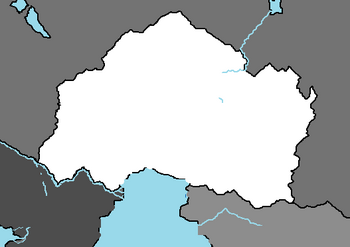Sontre
Republic of Sontre | |
|---|---|
|
Flag | |
 | |
| Capital | Leira |
| Largest city | Santara |
| Official languages | Sent, Et'nai |
| Recognised national languages | English, Aethnoan, Nuali |
| Government | Unitary parliamentary constitutional republic |
| Julliete Bornette | |
| Population | |
• 2020 estimate | 26,382,000 |
| Date format | mm-dd-yyyy |
The Republic of Sontre is a nation in northwest Euronia bordered by Gladysynthia and Noravia to the south, with a coast along Bay Hess. Its capital is Leira and its largest city is Santara. Nature in Sontre is dominated by forests and many lakes, and many long rivers run from the Vedra range through the landscape, primarily emptying into the sea. Most of the population lives along the Araes River. The vast majority of the population are ethnic Sontres. Sent and Et'nai are the official languages, while Aethnoan is the native language of 5.2% of the population. The country has a population of 26.4 million people.
Sontre has been inhabited for tens of thousands of years, with Åethnoa settlements dating back to 12,000 BCE. The Bronze Age and Iron Age were characterized by contacts with other cultures in the Hess region. Sontre was enveloped into the Gladysynthian empire as a consequence of the Sintra conquests in 1477. In 1809, as a result of the Araes Revolution, Sontre art flurished and the idea of independence began to take hold. Sontre gained independence from Gladysynthia in 1914 at the end of the Sarria War. Sontre largely remained an agrarian country until the 1950s. After the World War, it rapidly industrialized and developed an advanced economy, while building an extensive welfare state; the country soon enjoyed widespread prosperity and a high per capita income.
The current Prime Minister is Julliete Bornette, who has been in office since 2009. Sontre is a member of the Coalition of Crown Albatross, WEDA, and the CTO. Its economy is highly diversified and while it is quite small in comparison to neighboring giants, it is one of the most stable in the world and remained largely unaffected by recent global recessions.

